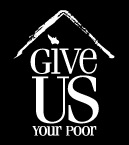There is a fast growing movement called social entrepeneurship taking place in the world today. Simply put, social entrepeneurship means applying business models to social problems and organizations that make a social impact. So, instead of getting a government grant to fund activities to, say, bring light to extremely poor people in Cambodia, they create a business plan to do it. The plan answers questions like, What is the need of poor people in Cambodia for light? What are the residual benefits of having that light? What are the costs to provide that light? Are there innovative technologies, or, innvoative uses of old technologies that can help provide light? What will the market bear (what can poor people afford to pay)? Sometimes the answers are surprising. The collective purchasing power of poor people collectively can be a substantial amount of money. If a business markets to them they can make a lot of money collectively while offering a very affordable product--in this example, light. Social entrepeneurs are often not in the business of making money--that is not their end goal, to maximize profit--rather to help people. They use a business model to make money to make their service sustainable.
There are different versions of the above model among social entrepeneurs. Some are purely a business models, some rely on subsidizing some part of the costs from either government or foundations.
Most of the models I have seen in this field address people living in extreme poverty, or if not extreme (living on $1 US a day or less) then in very poor countries in the developing world. Why hasn't this model been applied to homelessness in the United States to a wide degree? [It has been applied but on rare occasions.] Is it because in developing world the difference between the consumer (extremely poor peopel) and the entrepeneur is so great, that the differnence in scope makes applying the business model more easily doable? In the U.S. it is the descrepency is not as great. Housing doesn't cost $500 it costs more like $30,000 for very low income housing.
Tuesday, July 29, 2008
Tuesday, March 25, 2008
Give US Your Blog
In 2005 I wrote Jim Musselman of Appleseed Recordings to see if he was interested in partnering on a benefit music CD about homelessness. Music has connected me to the world in profound ways particularly since I became addicted to a little known group called the Beatles. That led to love affairs with Bruce Springsteen, and eventually starting a band called the Wait with friensds (our mothers bought most of the Cds we created). I also became increasingly sucked into the issue of homelessness as I met more and more homeless people, and researched the issue through my work at UMass Boston. Marrying the two was unavoidable, but how? Little did I know that Musselman had also been profoundly affected by music, particularly folk music, people like Bob Dylan and Pete Seeger.
Subscribe to:
Posts (Atom)

